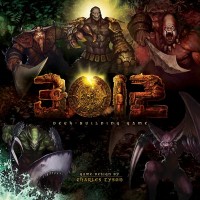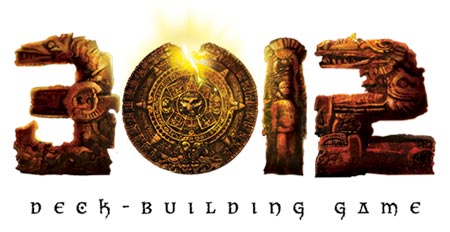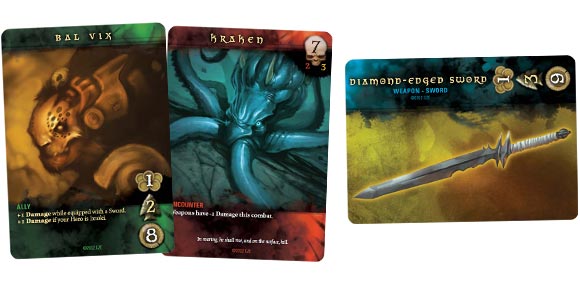
3012 Deck-Building Game

The year is 3012. It's been a millennium since the Armageddon. Deep in the Yucatan jungle, humanity has mutated, degenerated, and segregated into five clans: Jaguar, Snake, Monkey, Gar, and Bat. These clans now battle it out for dominance in the region, cooperating when it suits them and actively working against each other when the opportunity arises.
Starting with only a handful of Scouts, you will build up your clan's presence by adding Weapons, Allies, Gold, and Action cards to your deck. Soon you will have amassed enough strength to take on Encounters, where you can really prove your worth. He who can prove is mastery over steel, mesh, and fear will be crowned the Living God and win the game!

Key Features
- 2–4 players vie for dominance in this strategic deck-building game.
- Features player interaction during almost every turn—you are never out of the action!
- Level up your Hero! Build up your Hero’s combat ability by gaining experience from Encounters.
- Comes with everything you need to play right out of the box.
User Reviews (1)
Add a Review for "3012 Deck-Building Game"
You must be logged in to add a review.

 3012 Deck-Building Game
3012 Deck-Building Game
I played this one at my FLGS board game night, from someone who had apparently gotten it at Gencon. I’m a fan of deckbuilders, and the theme for this one was really attractive; it’s essentially like Thunderstone, only you’re playing tribes of jungle beastmen a millennium after the Mayan apocalypse (I have a nerd-on for Meso-American mythology).
Unfortunately, aside from being nearly as random as Ascension, the game suffers from a very interesting flaw; it both plays too slowly and is over too soon. ‘Plays too slow’ is due to how individual turns take an absurd amount of time to resolve for a deckbuilder without any combing. This is compounded by the fact that only 4 of your 6-card hand actually comes from your deck, the other two come from two communal decks, and you only get to see them at the beginning of your turn; so you can’t really plan your next turn while you’re waiting. And while you can play Scouts on your opponent’s turn to help or hinder their monster-slaying (and getting a cut of XP if you’re on the winning side), any expended Scouts get replaced at the beginning of your turn, which further stymies any ability to plan.
‘Over too soon’ is due to how quickly the game actually ends when measured in rounds; the game we played couldn’t have lasted more than ten. The person who won had only slain five monsters (slain monsters are the Victory cards in this game), and two others had only slain two each. Also, you only start the game with four cards; and with only ten rounds of buying plus trashing, my final deck only had about fifteen or so cards in it (including my four slain monsters). So it’s a deckbuilding game where you never really feel like your building an actual deck.
The other reason for the low amount of monster slaying is due to how random fights are; each one requires one or more dice rolls to not get completely screwed, or to not have the monster just run away. This, plus your opponents’ decision to help or hinder you, plus the random two cards from the communal pile, plus the lack of actual deckbuilding (and the fact that the Ascension-like purchasing strategy of ‘buy the best weapon/ally you can afford.’), ultimately means that your ability to kill anything has almost nothing to do with any decision you made throughout the game.
The only real choice you get to make is whether to help or hinder an opponent’s fight. And even that is conditional on if you have a Scout in your hand to play (while you start with 4 out of a 4 card deck, fights don’t really start until a third of the way in, and Scouts are often fodder for trashers to gain Allies or Weapons.) And 2/3 of the time, the other two player’s just followed the first one’s decision.
One of the other players described it as a deckbuilding version of Munchkin, which I’m inclined to agree with. It’s only advantage over Munchkin, other than the art and theme, is that a player with a solid lead can effectively cement his victory by helping fights whenever possible in order to leech extra XP, since hitting max level is one of the endgame conditions.
Summation: a very pretty game with almost no strategic depth, whose only saving grace is that it doesn’t drag on too long. I would have given it a rating of 3 since I didn’t outright hate the game, but I bumped it up to a 4 because I kinda had some fun playing (I just can’t see myself playing it a second time unless there was nothing else around), and then up to a 5 solely because the theme was something I’d like to see more of.